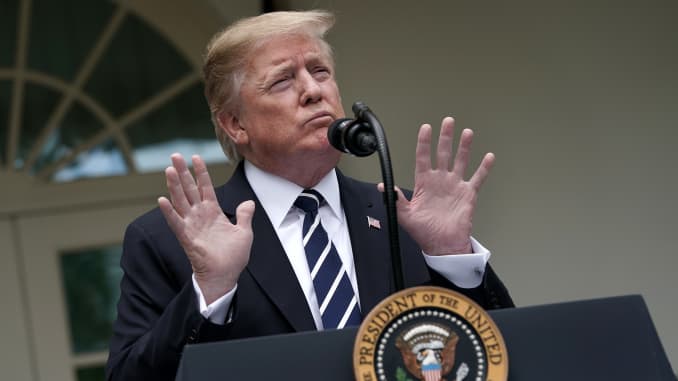- The Trump administration on Thursday asked the Supreme Court to temporarily halt an appeals court ruling that would force the Justice Department to hand over to Congress secret grand jury materials produced in connection with former special counsel Robert Mueller’s Russia probe.
- Solicitor General Noel Francisco wrote in a brief with the top court that allowing the lower court ruling to stand would require the government to disclose the materials on Monday. He wrote that the March decision by the U.S. Court of Appeals for the D.C. Circuit created “substantial constitutional difficulties.”
- The request, submitted by Solicitor General Noel Francisco, is the latest to thrust the justices into the middle of a partisan fight between Democrats and Republicans. The nine-member court has a 5-4 conservative majority, including two of President Donald Trump’s own appointees.

The Trump administration on Thursday asked the Supreme Court to temporarily halt an appeals court ruling that would force the Justice Department to hand over to Congress secret grand jury materials produced in connection with former special counsel Robert Mueller’s Russia probe.
The U.S. Court of Appeals for the D.C. Circuit in March ordered the normally secret materials to be turned over to the Democratic-led House Judiciary Committee. The committee sought the records as part of an investigation into whether Trump had committed impeachable offenses.
The request, submitted by Solicitor General Noel Francisco, is the latest to thrust the justices into the middle of a partisan fight between Democrats and Republicans. The nine-member court has a 5-4 conservative majority, including two of President Donald Trump’s own appointees.
While Trump was acquitted by the Senate in his impeachment trial in February, House Democrats have said their investigations are ongoing. They have said that they may pursue new articles of impeachment if the grand jury materials reveal new evidence.
Francisco wrote in his brief with the top court that allowing the lower court ruling to stand would require the government to disclose the materials on Monday. He wrote that the March decision created “substantial constitutional difficulties.”
Grand jury materials are typically closely guarded, though courts may authorize their release under certain conditions. One exception to the normal secrecy rule is when the records are sought in connection to a judicial proceeding. The Democrats have argued that an impeachment trial is a judicial proceeding, but the Justice Department argues that it is not.
Francisco wrote in his filing with the top court that finding that impeachment trials are judicial proceedings “would raise serious separation-of-powers concerns because it would mean that federal courts could impose conditions on Congress’s use of grand-jury materials in impeachment trials.”
House Democrats said they do not oppose an “administrative stay” of the lower court ruling for one week starting Monday, according to Francisco’s brief. But the Judiciary Committee notified the Justice Department that it will oppose a longer delay, he wrote.
In March, Circuit Judge Judith Rogers, writing for a 2-1 panel of the federal appeals court in Washington D.C., wrote that the Justice Department’s position “would raise as many separation-of-powers problems as it might solve.”
The Justice Department’s interpretation, she wrote, would “deprive the House of its ability to access such records in future impeachment investigations.”
“Where the Department is legally barred from handing over grand jury materials without court authorization, judicial restraint does not empower Congress; it impedes it,” Rogers wrote.
Rogers, who was appointed by Bill Clinton, was joined by Circuit Judge Thomas Griffith, a George W. Bush appointee. Trump appointee Neomi Rao dissented from the opinion.
The request comes just days before the top court will hear its first cases related to Trump’s own financial dealings. The high-profile disputes will be broadcast live to the public as the Supreme Court building remains closed as a health precaution against the spreading coronavirus.
On Tuesday, the court will hear oral arguments in two cases in which Trump is seeking to reverse lower court rulings ordering his banks and longtime accounting firm to hand over his financial records to Congress. A third related case being heard that day involves a subpoena for Trump’s tax records from Manhattan District Attorney Cy Vance, Jr.